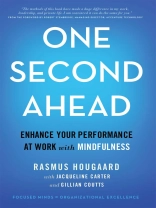Researchers have found that the accelerated pace of modern office life is taking its toll on productivity, employee engagement, creativity and well-being. Faced with a relentless flood of information and distractions, our brains try to process everything at once increasing our stress, decreasing our effectiveness and negatively impacting our performance. Ironically, we have become too overworked, unfocused, and busy to stop and ask ourselves the most important question: What can we do to break the cycle of being constantly under pressure, always-on, overloaded with information and in environments filled with distractions? Do we need to accept this as the new workplace reality and continue to survive rather than thrive in modern day work environments? Thankfully, the answer is no. In their new book, ONE SECOND AHEAD: Enhance Your Performance at Work with Mindfulness (Palgrave Macmillan; November 2015), Rasmus Hougaard, Jacqueline Carter, and Gillian Coutts demonstrate that it is possible to train the brain to respond differently to today’s constant pressures and distraction. All it takes is one second. They propose that we need to learn to work differently so we are more focused, calm and have less clutter in our mind so we can better manage our time and attention. What if we could hit the ‘pause’ button on our day, step back, and meet challenges with a sense of clarity and purpose? And what if there was a way not just of ‘getting things done, ‘ but ensuring that what does get done are the right things to do? Based on a program in corporate mindfulness designed by Hougaard and the partners of The Potential Project, One Second Ahead provides practical tools and techniques as well as real-world examples and lessons from organizations that have implemented mindfulness on a large scale. Thoroughly tested in a diverse range of industries, this program has resulted in measurable increases in productivity, effectiveness, and job satisfaction. With the new mindset proposedin One Second Ahead, readers will be able to put an end to ineffective multitasking, unproductive meetings, poor communication, and other unhealthy workplace behaviors by applying mindfulness to every day work life. All too often, we think that being mindful requires engaging in a special activity like meditation or yoga. Sure, these activities are beneficial and important to train the mind, but there are many simple things we can do to be mindful all day long. One Second Ahead is a handbook for more mindful work that offers: Practical, easy to apply, tools and techniques to enhance performance and effectiveness in day to day work activities such as meetings, emails, communication, planning, creativity and more Real-world stories of how mindfulness changed the workdays of leaders and front line employees Tips for cultivating mental strategies and routines that can reduce clutter, increase focus, and rewire your brain to enhance presence, patience, kindness and other valuable mindstates Simple yet detailed step-by-step instructions for a more systematic approach to mindfulness training to enhance focus and awareness Guidelines for a 10-minute-per-day mindfulness program that can reshape your life both at work and at home; A reproducible planning worksheet and further resources in the Appendix. One Second Ahead can transform daily work life by helping individuals and teams realize more of their potential through greater focus and awareness. The tools and techniques in this book can transform individual and organizational performance one mind at a time.
Table of Content
‘List of Figures
Foreword
Introduction
PART I: WORKPLACE TECHNIQUES
1. Mastering Your Mind – First Steps
1.1. Email
1.2. Meetings
1.3. Goals
1.4. Priorities
1.5. Planning
1.6. Communication
1.7. Creativity
1.8. Change
1.9. Mental Energy
1.10. Physical Energy and Activity
1.11. Performance Breaks
1.12. Sleep
1.13. Eating and Energy
1.14. Commuting
1.15. Emotional Balance
1.16. Work-Life Balance
PART II: MENTAL STRATEGIES
2. Presence
2.1. Patience
2.2. Kindness
2.3. Beginner ” ”s Mind
2.4. Acceptance
2.5. Joy
2.6. Balance
2.7. Letting Go
PART III: Foundational Practices
3. Training Sharp Focus
4. Training Open Awareness
5. Mastering Your Life – Next Steps
Appendix: Self-Directed Training Resources
Notes
Acknowledgments
About the Authors
About The Potential Project
Index
‘
About the author
Rasmus Hougaard is an internationally recognized authority on training the mind to be more focused, effective, and clear in an organizational context. Rasmus’ background combines research in organizational development with a corporate career and more than 20 years of practicing and teaching mindfulness. He is the Founder and Managing Director of The Potential Project – the global leading provider of corporate mindfulness programs. The Potential Project has helped organizations like Microsoft, Accenture, Roche, Nike, American Express, General Electric, Citrix, Google, Sony, Societe Generale, KLM, IKEA, Royal Bank of Canada, Ogilvy, Carlsberg and many more develop organizational excellence and helped thousands of individuals lead happier, kinder and more effective work lives.
Jacqueline Carter has over 20 years of consulting and management experience helping organizations manage change and achieve results. She is passionate about helping individuals and organizations realize their potential through training the mind. She is a Partner of The Potential Project International and Director of The Potential Project North America. Her clients include Google, Sony, American Express, Royal Bank of Canada, and Suncor to name a few. Jacqueline is a contributor to The Huffington Post and has appeared on Channel News Asia Breakfast Television, as well as radio talk shows.
Gillian Coutts has over 20 years of experience as a leader and change agent in the sales and operations functions of large corporations. She has worked across a range of industries including retail, government, transport, oil and gas, and human services. Gillian is a Partner with The Potential Project Australia. Her clients include Yahoo!7, Telstra, BUPA, and large not-for-profit organizations. She also sits on a number of boards and regularly speaks on integrating mindfulness into leadership, work life, and – following her own wake-up call of cancer diagnosis and treatment – programs for post-traumatic growth.












